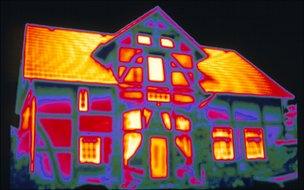Harrabin's Notes: Green Deal
- Published
In his regular column, BBC environment analyst Roger Harrabin looks at the implications of the Coalition's Green Deal for rented housing.
GREEN DEAL
Should a landlord be allowed to let a property that's impossible for a poor tenant to keep warm?

30 organisations have urged ministers to introduce minimum standards of energy efficiency
At the moment it's not an offence - and the Coalition has no intention for it to be one.
Housing in the private rented sector is often old and draughty. The English Housing Survey considers that nearly half the properties in the sector are not of a "decent" standard. Private rented homes are four times more likely to be cold than social rented housing.
A group of 30 organisations led by Friends of the Earth has now written to ministers urging them to introduce minimum standards of energy efficiency for any property put up for rent.
The campaign is supported by Labour's Ed Miliband. And I understand that officials at Department of Energy and Climate Change (Decc), frustrated by lack of progress on cutting carbon emissions from housing, are in favour of it, too.
But Decc has been trumped in an inter-department row by the departments for business and local government, The Department for Business, Innovation and Skills (Bis) and the Department for Communities and Local Government (CLG), which have insisted that new laws should be avoided wherever possible.
So landlords are going to be given until 2013 to see how they respond to the government's Green Deal launched today, under which home owners can get energy firms to insulate their properties free of charge, with the costs being recouped from power bills in the long term.
Decc has given itself powers to take legal action against landlords if they don't grab the Green Deal firmly enough.
But the targets are not clear, nor are the penalties for landlords who don't get around to insulating their properties.
A government source told me: "It is true there have been frank inter-departmental discussions over this issue. The Green Deal is perhaps not as strong as it might have been for the private rented sector but it's a lot better than what we have now, which is nothing."
Apparently one fear was that landlords would stop letting out properties if they were compelled to refurbish them, thereby contributing to the housing shortage.
You can get a clue to this from Decc's statement: "Regulation will only be used as a last resort if we do not see the much needed improvement in the (private rented) sector. A review in 2013, to be published by 2014, will ensure regulation is used as a last resort and will not impact on the supply of properties in the sector."
But this is puzzling. It suggests that landlords might dodge laws forcing them to provide decent homes.
If this is so, what is the evidence that they will do the insulation work voluntarily? And if they have to be forced to do the work after the aforementioned review date of 2014, what evidence is there that they'll be any less prone then to dodge the laws by taking their properties out of the sector?
When I asked my contact I couldn't get a good answer. That's why critics say today's legislation is an inter-departmental fudge that still doesn't guarantee warm homes for some of the most vulnerable people in society.